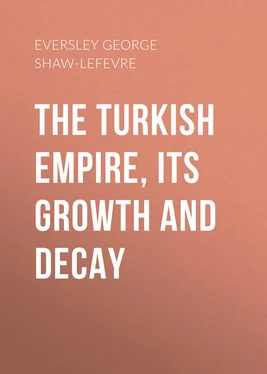George Eversley - The Turkish Empire, its Growth and Decay
Здесь есть возможность читать онлайн «George Eversley - The Turkish Empire, its Growth and Decay» — ознакомительный отрывок электронной книги совершенно бесплатно, а после прочтения отрывка купить полную версию. В некоторых случаях можно слушать аудио, скачать через торрент в формате fb2 и присутствует краткое содержание. Жанр: foreign_antique, foreign_prose, на английском языке. Описание произведения, (предисловие) а так же отзывы посетителей доступны на портале библиотеки ЛибКат.
- Название:The Turkish Empire, its Growth and Decay
- Автор:
- Жанр:
- Год:неизвестен
- ISBN:нет данных
- Рейтинг книги:3 / 5. Голосов: 1
-
Избранное:Добавить в избранное
- Отзывы:
-
Ваша оценка:
- 60
- 1
- 2
- 3
- 4
- 5
The Turkish Empire, its Growth and Decay: краткое содержание, описание и аннотация
Предлагаем к чтению аннотацию, описание, краткое содержание или предисловие (зависит от того, что написал сам автор книги «The Turkish Empire, its Growth and Decay»). Если вы не нашли необходимую информацию о книге — напишите в комментариях, мы постараемся отыскать её.
The Turkish Empire, its Growth and Decay — читать онлайн ознакомительный отрывок
Ниже представлен текст книги, разбитый по страницам. Система сохранения места последней прочитанной страницы, позволяет с удобством читать онлайн бесплатно книгу «The Turkish Empire, its Growth and Decay», без необходимости каждый раз заново искать на чём Вы остановились. Поставьте закладку, и сможете в любой момент перейти на страницу, на которой закончили чтение.
Интервал:
Закладка:
On the morning of the battle of Nicopolis, Bayezid, when told of the heavy losses of his own army, and that in the early part of the battle the chevaliers had massacred a number of Turks who had surrendered on promise of life, was greatly incensed. He gave orders that all the Christian prisoners to the number of ten thousand were to be put to death in his presence. He made an exception only in favour of twenty-four of the knights, including de Nevers, their leader, for whose release a heavy ransom might be expected. But they were compelled to witness the execution of their comrades in arms.
On taking leave of them a year later at Brusa, Bayezid addressed de Nevers in these proud and insolent terms: —
John, I know thee well, and am informed that you are in your own country a great lord. You are young, and in the future I hope you will be able to recover with your courage from the shame of the misfortune which has come to you in your foul knightly enterprise, and that in the desire of getting rid of the reproach and recovering your honour you will assemble your power to come against me and give me battle. If I were afraid of that and wanted to, before your release, I would make you swear upon your oath and religion that you would never bear arms against me, nor those who are in your company here. But no; neither upon you nor any other of those here will I impose this oath, because I desire, when you have returned to your home, and will have leisure, that you assemble your power and come against me. You will find me always ready to meet you and your people on the field of battle. And what I say to you, you can say in like manner to those to whom you will have the pleasure of speaking about it, because for this purpose was I born, to carry arms and always to conquer what is ahead of me. 9 9 Froissart, xvi. 47.
Before their final departure, Bayezid treated these knights to a day’s sport on a regal scale; seven thousand falconers were employed on the occasion, and five thousand men led dogs to pick up the game. The historian does not state what was the bag resulting from this great battle.
Of the twenty-four knights only one, Marshal Boucicaut, took up the parting challenge of Bayezid and returned to the East to make war against him. The others showed no desire to wipe out the disgrace of their defeat. 10 10 Boucicaut in 1399, with four ships and two armed galleys and twelve hundred knights and foot soldiers, after defeating an Ottoman fleet in the Dardanelles, arrived at Constantinople and gave assistance to the Emperor in defence of the city.
After this great battle at Nicopolis the Ottoman army made irruptions into Wallachia, Styria, and Hungary. The city of Peterwardein was captured and eighteen thousand of its inhabitants were sold into slavery. Another division invaded Syrmia, and devastated the country between the Drave and the Danube. The fortresses on the river taken by the crusaders were recaptured. The raid into Wallachia was a failure. The Turks engaged in it were defeated and driven back. Bayezid himself threatened Buda, in Hungary, but his progress was checked by a long and painful fit of gout. Gibbon moralizes on this in the following sentence: “The disorders of the moral are sometimes corrected by those of the physical world; and an acrimonious humour falling on a single fibre of one man may prevent or suspend the misery of nations.” 11 11 Gibbon, viii. p. 114.
The invasion of Hungary on this occasion was a failure.
After this campaign Bayezid returned to Adrianople, and there occupied himself by inflicting further humiliations on the Greek Empire. He forced Manuel to resign and imposed John, the son of Andronicus, as its Emperor. He then issued forth again with his army, in 1397, and fell like a thunderbolt on Greece, without any warning or cause of complaint. He marched with his army through Thessaly, capturing on the way Larissa and Pharsalia. He passed through Thermopylæ. The mere passage of his army sufficed to subdue Doris and Locris. His two generals, Yacoub and Evrenos, then invaded the Peloponnesus. The latter captured and pillaged Argos. Its inhabitants, to the number of thirty thousand, were sold as slaves and deported to Asia. Colonies of Turks were planted in the Morea. Theodore Palæologus, who acted as despot there on behalf of the Greek Empire, agreed to become tributary of the Sultan.
Returning to Adrianople, Bayezid determined to obtain immediate possession of Constantinople. The Greek Empire had been already deprived of nearly all territory outside the walls of its capital. The Sultan opened proceedings against it by sending an envoy to the Emperor with this insulting message: —
When I dethroned your predecessor, Manuel, it was not in your interest but in mine. If, then, you want to remain my friend, you must surrender your crown. I will give you any other government you may wish for. If you do not consent, I swear by God and the Prophet I will not spare a soul in your city; I will exterminate all of them.
The citizens of Constantinople, rather than experience the terrible fate which they knew would befall them in the event of a successful assault by the Ottoman army, were willing to come to terms. But the Emperor, who was buoyed up by hope of assistance from the Christian Powers, refused to acquiesce in a pusillanimous surrender. He replied to the ambassador in dignified terms: “Tell your master that, feeble as we are, we know no other power to whom to address ourselves if it be not God, Who protects the feeble and humbles the powerful. Let the Sultan do what he pleases.”
At this stage, and before he could give effect to his threats, Bayezid was compelled by great events in Asia to raise the siege of Constantinople. Hitherto, in twelve years of incessant war, Bayezid had been uniformly successful. He had annexed the greater part of Asia Minor, Macedonia, Northern Bulgaria, and Thessaly. He had reduced to vassalage the Greek Empire itself and Serbia, Wallachia, Bosnia, and a great part of Greece. He had defeated the feudal chivalry of Europe in the great battle of Nicopolis. He had not met with a single reverse. The next two years, the last of his reign, were to result in disastrous and overwhelming defeat to him, in his capture and death, and in the temporary crumpling up of the Turkish Empire. He came into conflict for the first time with Timur, a general and a conqueror more resolute, crafty, able, and cruel than himself.
Timur the Tartar, better known to us as Timurlane – Timur the lame, for he had met in early life with an accident which lamed him – was the greatest, the most ruthless, and the most devastating of warriors recorded in all history. Born in 1333, a descendant through his mother of the great Gengis Khan, he began life as a petty chief of a Tartar tribe in the neighbourhood of Samarkand. It was not till he had reached the age of thirty-five that he achieved eminence over other neighbouring Tartar States. He then conceived the ambition of universal conquest. “As there was only one God in heaven,” he said, “so there should be only one ruler on earth” – that one was to be himself. He went a long way towards gaining this object of his ambition, for he embarked on a career which, in rather less than thirty-five years, resulted in an empire extending from the Great Wall of China to the frontier of Asia Minor, and from the Sea of Aral to the River Ganges and the Persian Gulf. He had, by this time, conquered twenty-seven separate States and extinguished nine dynasties. He effected his purpose, not only by force of arms, but by a deliberate policy of terrorism. After victory he was of settled purpose ruthless in cruelties on the greatest scale.
It was obvious that, sooner or later, he would come into conflict with what was, at that time, the only other growing military Power in the world – the Ottoman Empire. The two potentates had already become neighbours, and causes of dispute and antagonism were often arising between them. Each had sheltered refugee princes, whose territories had been absorbed by the other, and who were engaged in intrigues to stir up war between the two rivals, in the hope of regaining their possessions. Insolent messages passed between the two potentates.
Читать дальшеИнтервал:
Закладка:
Похожие книги на «The Turkish Empire, its Growth and Decay»
Представляем Вашему вниманию похожие книги на «The Turkish Empire, its Growth and Decay» списком для выбора. Мы отобрали схожую по названию и смыслу литературу в надежде предоставить читателям больше вариантов отыскать новые, интересные, ещё непрочитанные произведения.
Обсуждение, отзывы о книге «The Turkish Empire, its Growth and Decay» и просто собственные мнения читателей. Оставьте ваши комментарии, напишите, что Вы думаете о произведении, его смысле или главных героях. Укажите что конкретно понравилось, а что нет, и почему Вы так считаете.












